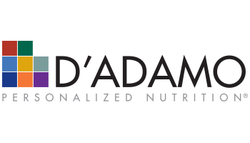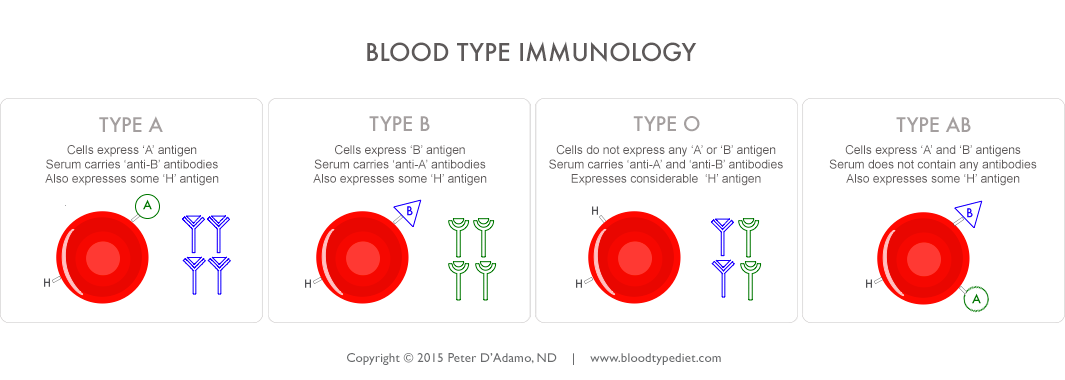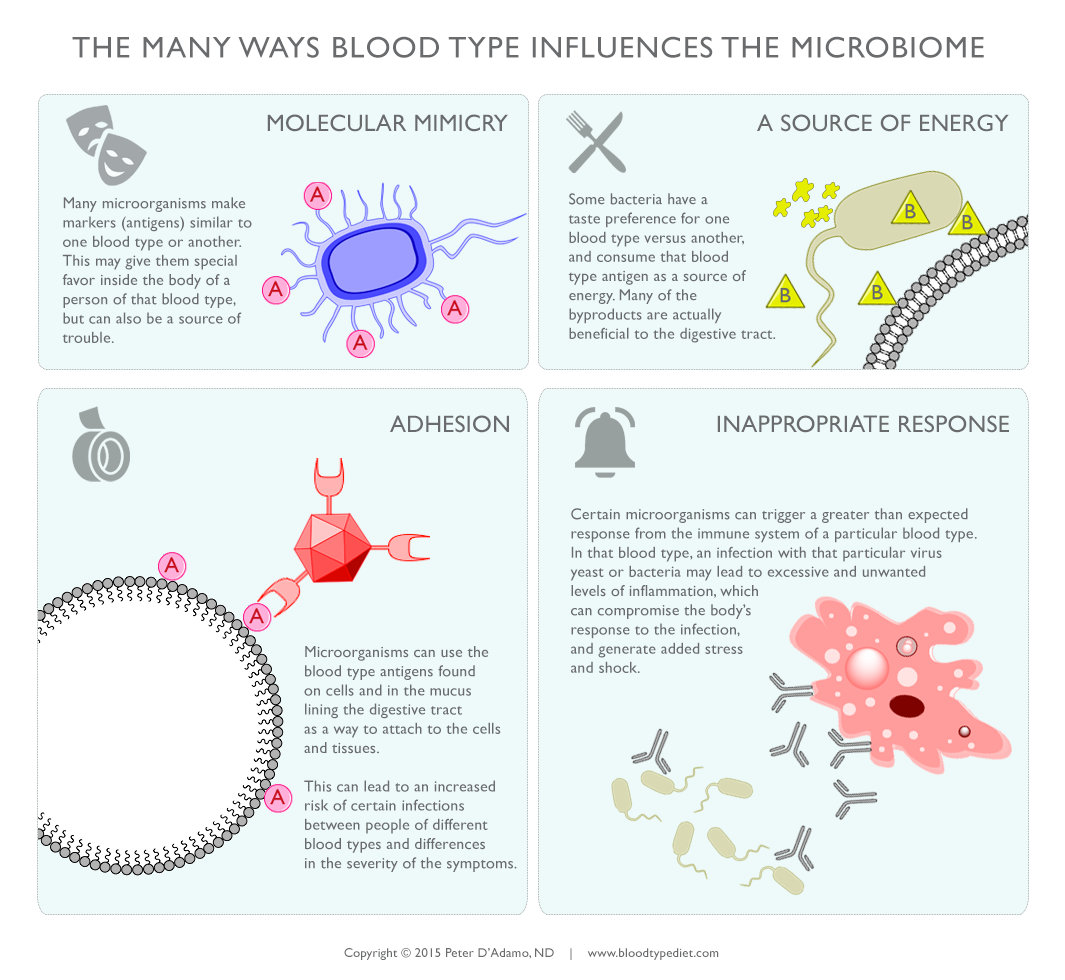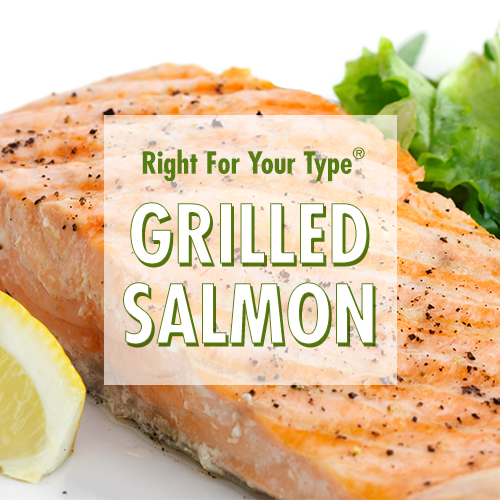Volume 12, Number 06
- Blood Type and The Microbiome (Part 2) by Dr. Peter J. D'Adamo
- Product Highlight: ARA 6
- Healthy Colon Support with Butyrate
- While we are on the subject of bugs...
- Lessons From My Father by Martha D'Adamo
- Recipe: Grilled Salmon & Summer Slaw Recipes
- June Product Specials: 20% OFF Intrinsa, Polyflora & ARA 6
Blood Type and The Microbiome (Part 2)By Dr. Peter J. D'Adamo |
||
 |
Editors note: This is the 2nd installment of a 2-part series by Dr. D'Adamo exploring the connection between blood types and the microbiome. Read part 1 of the article from our May 2015 issue. |
|
|
More and more, we hear and read about the importance of the microbiome: the ecological community of friendly and unfriendly microorganisms that share our body space. The human body contains as much as ten times more microbial organisms than human cells, and increasingly, changes to the microbiome are being associated with both good and bad alterations to our health. Blood Type Connections Most laypeople and physicians can be forgiven for wondering what blood type could possibly have to do with the microorganisms in the digestive system. Blood type, after all, is just an ornament on a red blood cell, right? Simply a complication of transfusion. Sadly, not much else about blood type is taught as part of the standard medical curriculum. However, readers of my books and followers of my diet theory already know that there is a much deeper and important role that blood type plays in conditioning our digestive tract; both in terms of the characteristics of the lining (mucosa) and the variations of the secretions (digestive juices) produced by the stomach and intestines. These blood type specific differences can themselves have an important effect in altering the microbial balance of the digestive tract. But there are even more elemental and direct ways that blood type can condition the microbiome. The blood type antigens (the marker that distinguishes one ABO blood type from another) are widely distributed throughout the digestive tract, embedded in the mucus lining that insulates the gut tissue from the rather harsh internal environment. The most common blood group antigens are proteins that contain the sugar fucose. This the most basic building block, and is called the H antigen. Although we commonly think of blood type O and not possessing a blood group antigen, the name 'O' was chosen to signify the number zero. The rationale behind that label only relates to the fact that type O blood does not trigger an immunologic reaction when transfused into the other ABO types. Type O blood does in fact possess an antigen, the so-called 'H' antigen. However, since all the other ABO types also make H antigen, it is not immunologically reactive in them, and allows type O to function as the 'universal donor.' So, to tie this important relationship together, let's put it in a nice infographic:
Blood Type Antigens as Bacterial Snack Food
Blood Type Antibodies as Nightclub Bouncers However, similarity between your blood type antigen and the antigens on a microbe are no guarantee of future harmony. Just as an uninvited guest can sometimes get past the nightclub bouncer by claiming that 'I'm with the band,' microbes with ill-intent can evade the basic defenses by developing the ability to mimic the blood type antigen of their potential host/victim. Just as in Star Trek, this 'cloaking device' gives them a degree of invisibility from the immune system. In one study, bacteria antigens that cross-reacted with blood group antigens were detected on cell walls of anaerobic bacteria from 30% of the cultures inoculated. Other microbial felons may have an advantage due to their possessing specialized ways to attach to the blood type antigens in the gut, which makes infection much easier. Many of these 'molecular suction cups' are adhesive-type lectins, a class of proteins also found in many foods. A huge amount of research has been done correlating the differences in resistance to pathogenic microorganisms that exist between the different blood types. Historically, some of the most catastrophic epidemic and endemic diseases are ABO selective, and in many instances demonstrate ABO related differences in morbidity (sickness), mortality (death), or the level of the inflammatory response to the infection. There are some very practical recommendations, which can help increase the diversity of microbes colonizing your gut:
|
||
Healthy Colon Support with Butyrate |
|
|
Butyrate is a short chain fatty acid normally appearing because of colonic fermentation of fiber in the gut. Butyrate is a preferred source of energy for the cells of the intestinal lining, and several studies suggest that it is the effect of butyrate that actually gives dietary fiber its cell-supporting properties. Ghee, an Ayurvedic preparation of clarified butter, is loaded with short chain fatty acids, including butyric acid, and it is good for all types. |
|
 |
Here's an easy recipe to make your own Ghee: Ingredients: Directions: |
|
What is Ghee? It is basically butter that has the milk solids and water removed. According to Ayurveda, Ghee (clarified butter) is the best oil for cooking. This is because when used in moderation it stimulates the digestion (Agni) better than any other oil. Give it a try! It is very tasty and without the side effects of plain butter. Note: Ghee does not require refrigeration if you keep moisture out of it; for example, don't dip a wet spoon into the ghee jar. If you want to get your butyrate in supplement form, our ARA 6 product will increase butyrate concentrations in the intestines, and Intrinsa is a butyric acid and caprylic acid formula with larch, and these two products support healthy stomach, intestine, and colon function. |
|
While we are on the subject of bugs... |
 |
|
Here's a great reminder about mosquitoes, particularly as we get into the summer season in the US. Research shows that they make their choice of victim by blood type and secretor status. Blood Type O/Secretors had a higher landing rate of mosquitoes (83.3%) than Blood Type A/Secretors (46.5%). B's fell somewhere in the middle of O and A. Good general tips for all Blood Types:
Until then, keep covered and alert, and use natural repellents that contain citronella, lemon eucalyptus, rosemary, lemongrass, or cedar oil. For more info:
|
Lessons From My FatherBy Martha D'Adamo |
|
 |
Every June, we have an opportunity to think about those significant men in our lives and how they've helped to shape and form who we are. Although my father passed away over 20 years ago, his character – his essence, so to speak – persists, whether it is in the piece of furniture that he restored which we have in our home, the blooming peonies and my memories of his garden, in quirky habits our daughters have that have some genetic connection to him, or in the very simple and moral way he lived his life. He was the valedictorian of his high school class in Scranton, PA in 1936, and I have his original typed notes in which he circled words he wanted to emphasize in his delivery. It begins: We sail with a clear purpose and happy hearts on our new venture into the sea of life. That sea is not calm, but is disturbed by economic storms, which we must battle. Some of us will seek to further our educations; others will enter some occupation; whatever we may do, the training, which we have received at Technical High School, will pilot us safely through these storms. This is as true today as it was back then, and it is not only limited to those who graduate. Embarking on any new journey, whether it is education, a new job, relocation or a new lifestyle requires that we draw upon all the resources we have as we make that transition. He continued: Set high standards for the students in the lower classes, and remember to maintain those set by those who came before us. In doing so, you may pass this mantle to your successors, untarnished as you have received it. The call to lead and to set standards is as appropriate today as it was in 1937. Our world needs this – globally and locally -- and it is hard to conceive of what the world would look like if each one of us lived our lives this way. This is the blueprint for radical transformation! Not contained in his speech were other words of guidance he imparted on us: Finish what you start In later years, when I brought Peter home to meet my parents, my father met a kindred soul -- a fellow traveler, engineer, artist, geek (although we didn't have that word at the time). A man who loved music and circuit boards, who could delight in solving a tricky engineering problem as much as weeding a garden. They shared a deep and wonderful connection, and I was privileged to witness their friendship blossom, trading stories, learning from each other and at the end of the day, sharing a laugh and a beer. This June, I'd like to pick up the mantle that has been passed on to me and honor the spirit of my father and all the men in our lives, who inspire us and want us to be better people. I was fortunate to have my dad, and my good fortune continues as I have Peter as my partner, my best friend, the father of my children and the love of my life. He continues to inspire me and encourage me to be my best self, and I am truly grateful. Happy June and Happy Father's Day. Martha |
Summer BBQ EssentialsA Right For All Types Recipe |
||||||||||
|
||||||||||
|
Find more delicious side dishes and recipes as well as healthy cooking tips in the Eat Right for Your Type Personalized Cookbooks |
||||||||||






